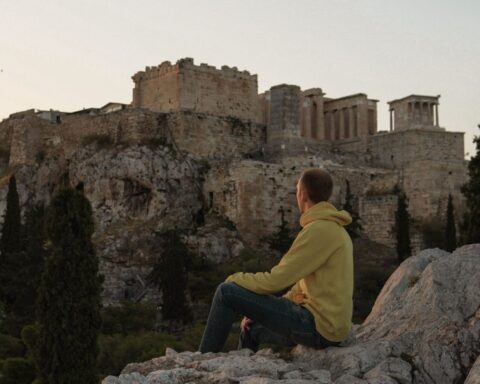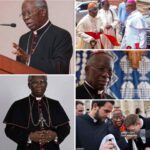By Lasisi Olagunju
Who knows Òkòlò in Oyo? Òkòlò was a Tapa (Nupe) and a slave of the Alaafin of Oyo. His duty was to gather grass to feed the king’s horses.
The man was a slave with freeborn friends, and he had quite many. One day, one of those friends was found to be owing someone a thousand cowries –which was a hefty sum in those early days. Payment was due but Òkòlò’s friend could not find the money to repay the debt.
The debtor, accompanied by Òkòlò, went to the creditor and pleaded for time. He promised to repay the money within three days and asked that his friend, Òkòlò, be held as surety in the meantime. Òkòlò had no problem with that arrangement but the wealthy creditor looked at Òkòlò, head to toe, and hissed. He told the debtor to find someone else, not this one. Then, turning to Òkòlò, the rich man said:
“Ta ní mò Òkòlò l’Ọ̀yọ́, sebi oko esin ni o npa? (Who knows Okolo in Oyo, is he not just a grass cutter, chef for the king’s horse?)” The rich man hissed again.
The statement wounded Òkòlò to the heart. It meant he was a nobody in Oyo.
That night, while everyone slept, Òkòlò went alone to the rich man’s house and set it on fire. He did it and stayed put. He stood where he committed the crime of arson until he was caught.
Òkòlò, the arsonist, was brought before the king. Alaafin asked him why he committed the act. Okolo replied that ever since he arrived in Oyo, no one had regarded him as someone of worth. The climax was the rich man counting his nine toes before his very eyes. He said the insult that no one knew him in Oyo wounded him deeply, and that that was why he burnt the house so that the man and all Oyo people would finally know he was present and able.
The Alaafin listened attentively and had a deep sigh. He asked the rich man if it was true he uttered those words against the poor slave. The big man looked down and said “Yes, Kabiyesi.” Alaafin rebuked the rich man for not knowing how to talk (kò mo òrò so). The king then ordered his royal workers to rebuild the burnt house of the man who had money but lacked tact and decorum. Òkòlò was not punished; instead, he became a free somebody now known all over the empire.
From that day forward, no one said again: “Ta ní mò Òkòlò l’Ọ̀yọ́, sebi oko esin ni o npa? (Who knows Okolo in Oyo, is he not just a fodder gatherer for the king’s horse?).” Across Yorubaland, the saying changed in tone, form and meaning. It became: “Ta ní mò Òkòlò l’Ọ̀yọ́ kí ó tó ti iná bo ilé? (Who knew Òkòlò in Oyo until he burnt down a house?).” It has become a song line of victory for anyone who was once overlooked or dismissed as insignificant until a bold, dramatic act brought them recognition. Read Okolo’s story in S.O. Bada’s ‘Owe Yoruba ati Isedale Won’ (1973: page 63-64).
Lesson: Whatever we do or say, we should not leave anyone behind or set their esteem on fire. The forgotten and the despised will always force their way into view; they will announce their presence.
A viral video of President Bola Ahmed Tinubu’s visit to Kaduna last week shows the Commander-in-Chief in the midst of a momentary scare. It is a moment of intense unease that went viral and sparked varied interpretations. The president’s online enemies said the tiger momentarily lost his tigritude. The video clip is from the president’s TVC live coverage of the visit. The Nigeria police said the video was doctored by the president’s enemies to show the breach it depicts.
The story behind the incident: A man broke through security barriers and made a dash for the president where he stood, making a speech and blowing dogo turenchi (big grammar). The video shows neither the intruding man nor his dash. Instead, what announced his drama is the footage of a frozen president and a ruffled, rattled security taking positions. Police later clarified that the man was a certain Umar Mohammed, a native of Anguwan Muazu in Kaduna and “an ardent supporter of both the President and Governor Uba Sani.” Police said the man “acted out of overwhelming excitement” because he loved the president and the governor and wanted to be near them.
We are lucky the Kaduna man did not do what Òkòlò did in Old Oyo. The man merely caused a stir with a dash; he did not set the Nigerian house on fire.
The police did not stop at saying the unruly was the president’s man. They announced that Umar had a psychiatric disorder but was allowed into the venue like other APC supporters, dressed in party regalia and waving banners of his heroes. All political parties have enthusiastic supporters, the ruling party has, and they came out to receive their president in Kaduna. But, unlike others, the “mad” Òkòlò man of Kaduna did not stay in his lane; he crossed into the protected zone uninvited so that he would be unmissable by his idols. His leap over the protocol barriers at the venue of the presidential event was a symbolic act that echoed louder than any shout, and was shriller than any chant or cheer from his peers. He made a difference.
The man made a splash but the police said no weapon was found on him; what he was longing for was just the recognition by his two heroes and by all of us who would read his ‘heroic’ story. And he got what he wanted – if that was all he wanted.
The police suggested that the ‘innocent’ disruption was weaponised in online spaces by dark forces. It declared that the viral video had been doctored to misrepresent the man’s actions. The police frowned on the “distortion” of the footage into narratives of conspiracy and danger. It warned against such politicisation and announced that a probe was on. We will be happy to report the findings.
“Is that a threat?” asks Henry Ian Schiller in a 1975 article of that title where he interrogates the various categories of threat. It is Schiller’s position that sometimes, the presence of those who should not be present is a threat. Umar’s Kaduna obtrusion was. But I will be shocked if the desperate trespasser and his street mates cared about our concerns. Those in power who should care are also spinning the threat into the echo chambers of nonsense. There may be many more like that man where he leapt out from. I read the intrusion as not merely a disruption; I see in it a desperate performance of visible proximity for whatever reason.
I am an uninvited guest in this matter; now I am about to ask some uninvited questions on this case: If the Kaduna intruder was “mad” as the police claimed, who then gave the insane the party dress he reportedly wore? Chinua Achebe in his ‘The Madman’ parallels a mad man who is dressed up with a sane but naked Nwibe. Exactly like that pair, who should we say is really mad between the Kaduna clothier and the clothed who created a scene? How many more psychiatric patients were in those party dresses and in that crowd?
The police said the ‘mad’ man simply wanted to see his leaders up close. But in a society where the ill, the ignored, and the socially marginalised often blend into the background, his act of breaking into the elite cordon was a poignant daring demand for restitutory performance by the state. Those at the fringes must, sometimes, disturb and assail order to be seen and to be counted.
To dehumanise is to deprive of positive human qualities. A failed Nigeria has created many Òkòlò and Umar, desperate men of dehumanised existence. They fiddle with match boxes and hold dangerous torches in search of their stolen destiny. Some other mad people in that same North were filmed tearing down the president’s billboards. How bad is their own ‘madness’? What does all this tell about the future and the dreaded, high-stake elections that are coming?
In breaching the protocol in Kaduna, Umar Mohammed became a symbol of the invisible seeking recognition. His story is a reminder that those whom society overlooks, the voiceless, the deprived, have their own ways of announcing their presence. And often, their cries do not come through official microphones which are too far from the reach of their ‘dirty’ beings. Their cries barge in through unfiltered acts of yearning that disrupt polished stability. They always force a second glance by lighting a flare in the dark. Òkòlò did it in Old Oyo; Umar did last week in Kaduna.
Follow us on all social media platforms @dailyquery for news and analyses around the globe.



























